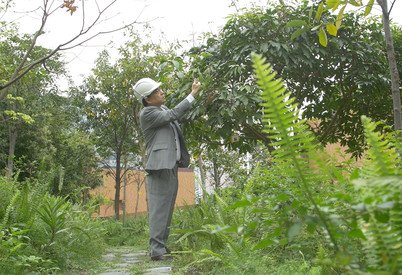A Champion of Trees
Trees in Hong Kong have never had it easy. Limited space, development pressures and an unclear system for protecting them means they are often at risk of being chopped down or poorly maintained. Fortunately, they have a strong advocate in Professor CY Jim, Chair Professor of Geography.
In most of my research papers, I include paragraphs on how the science can inform policies and practices.
Trees in Hong Kong have never had it easy. Limited space, development pressures and an unclear system for protecting them means they are often at risk of being chopped down or poorly maintained. Fortunately, they have a strong advocate in Professor CY Jim, Chair Professor of Geography.
Over the past three decades, Professor Jim has been researching and speaking out for Hong Kong's trees. He started by calling for protection of the magnificent large old trees he dubs "champion trees", which eventually led the Hong Kong government to set up a registry for these trees and inspired the Singapore government to go even further and set up a system to designate and protect the Lion City's champion trees.
Professor Jim has also lobbied for years for a tree ordinance in Hong Kong and although this has not yet been adopted, many of its components have been - especially after a fatal tree collapse case in 2008. The government has set up a Tree Management Office and started training personnel in proper tree management, and it has appointed Professor Jim to the government's Expert Panel on Tree Management.
"When trees are in trouble they can easily hurt people, so I still think Hong Kong should have a tree ordinance to ensure the standards of tree management reach international best practices in all aspects," he said.
An important contributor to healthy trees is healthy soil and Professor Jim has also made scientific and practical contributions in this area. He conducted detailed soil analysis of samples from more than 100 sites and, as honorary advisor to the government's Greening Master Plan Committee, he persuaded the Civil Engineering and Development Department to improve the soil before planting more trees.
"Urban soil in Hong Kong, particularly at roadsides, has very poor quality. A lot of it is construction rubble with all sorts of artificial fragments and contaminants that are entirely unsuitable for tree growth. Soil must be improved – or even better, replaced – to nourish strong, healthy and safe trees," he said.
Professor Jim also did a two-year project for the Hong Kong Housing Authority in which he and his team checked the conditions of 46,000 trees and developed a new tree management plan. He has also done several groundbreaking projects to green buildings. These include a green roof project at 14 schools that has since been replicated in many schools and other sites; a green wall project for the Drainage Services Department that enabled him to test different climber species for Hong Kong's climate and growth conditions; and a green roof-cum-wall project at a substation of CLP Power Hong Kong Ltd, where he has planted a woodland of native species on the roof and wrapped the building with climbers. He is now doing detailed micro-climate monitoring at that site.
Professor Jim is also in the midst of one of the most detailed studies of artificial turf in the world and is showing that this material contributes to the urban heat island effect and emits harmful gases. To this champion of the green, a natural turf is a much better option for the environment and for health.
His scholarly contributions were recognised in 2014 when he became the first Asian scientist to receive the L.C. Chadwick Award for Arboricultural Research presented by the International Society of Arboriculture.
"In most of my research papers, I include paragraphs on how the science can inform policies and practices. I'm happy that my findings can have practical applications and impact beyond the academia," he said.


